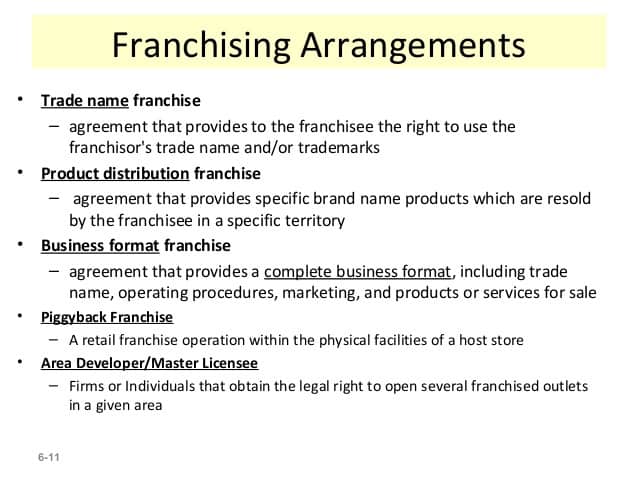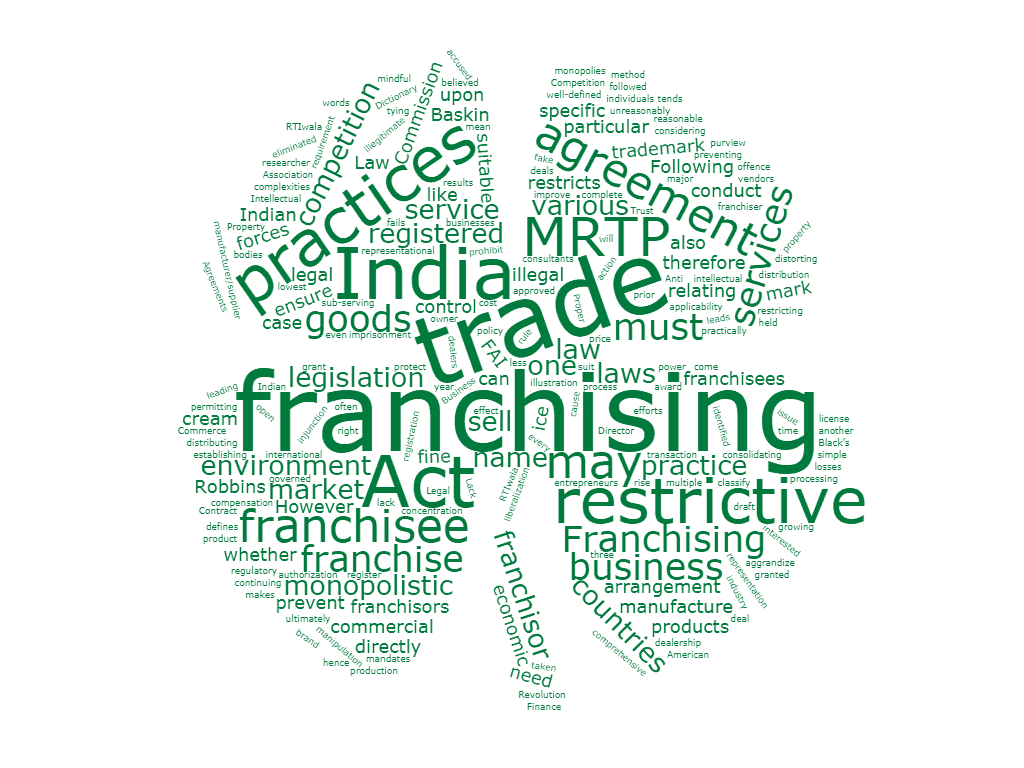RTIwala Explains Franchising in India: In India, as such, there is no particular legislation which directly deals with franchising. However, Finance Act 1999 defines a ‘franchise’ as: “an agreement by which the franchise is granted representational right to sell or manufacture goods or to provide service or undertake any process identified with the franchisor, whether or not a trademark, service mark, trade name or logo or any such symbol, as the case may be, is involved.”
In simple words, franchising is a method of distributing products or services. According to the Black’s Law Dictionary, the franchise as a license from the owner of a trademark or trade name permitting another to sell a product or service under that name or mark.[1] It is believed that goods and services are provided at the lowest possible price by the rule of open market forces. Any conduct, which unreasonably restricts those market forces, must, therefore, be eliminated. When considering the expansion of their businesses through franchising, entrepreneurs should review their business practices and be mindful of their conduct concerning business processing ways they follow[2]. The MRTP Act regulates and restricts monopolistic and restrictive trade practices. Under this Act, a restrictive trade practice is defined as ‘a trade practice which has or may have the effect of preventing, distorting or restricting competition[3]’.
Also Read: https://rtiwala.com/pradyuman-murder-case-haryana-cm-cbi-probe/#.WcvqDrKg_IU
Franchising in India: The Legal Imperatives
As such there are various legal issues in franchising, but here the researcher would like to go on directly on the issue relating to competition law and franchising in India. Under the Anti Trust law, the agreement between the franchiser and franchisee tends to overlook market competition which is a major concern nowadays. In the US, one of the leading brands in the manufacture of ice cream that is “Baskin Robbins” was accused of imposing an illegal tying arrangement when it required all franchisees to buy their ice cream from Baskin Robbins.
In India, the MRTP Act has been enacted to prevent concentration of economic power, control monopolies and prohibit monopolistic trade practices and restrictive trade practices. The franchisor or franchisee must ensure that their practices do not classify as monopolistic or restrictive, or else the Commission under the MRTP Act can grant an injunction to prevent such trade practices and may also award compensation for any losses or damage suffered thereby. For instance, if the franchisor makes an illegitimate demand that the franchisee must not sell goods less than a particular cost, or there is the fake representation about services or products, or if there is manipulation or aggrandize the intellectual property of the franchise, it could give rise to an action under the MRTP Act.
Also Read: https://rtiwala.com/aipc-professionals-congress/#.WcvqVrKg_IU
Further, the MRTP Act also mandates that agreements relating to restrictive trade practices for the provision of services or the production, storage, supply, and distribution or control of goods must be registered with the Director-General. However, the mere registration of such agreements does not mean that these agreements are per se illegal or void. But if a person, without reasonable cause, fails to register such contracts, he could be liable for imprisonment up to three months or with a fine of up to Rs. 5,000 or both, and a penalty of Rs. 500 for every continuing day of such offense.
Franchising in India: What is a Franchising Agreement?
A franchising agreement could often come under the purview of such “restrictive trade” agreements, and therefore it would be advisable to ensure whether these agreements need to be registered. For illustration, in one case, the MRTP Commission held that a requirement in a dealership agreement that sub-serving dealers will be appointed only with prior authorization of the manufacturer/supplier would be practically the same as to a restrictive trade practice. Therefore, depending upon the situation in each franchising deal, the agreement may or may not have to be registered.

Regarding franchising, though the business and commercial laws in India can protect and govern a franchise arrangement, there is a growing need to improve this regulatory and legal framework. Following the economic liberalization of 1991, a firm step was taken in the year 1999 towards consolidating the franchising industry in India, by establishing the Franchising Association of India (“FAI”), through the efforts of the Indo- American Chamber of Commerce. FAI represents the interests of franchisors, franchisees, vendors, consultants, and other interested individuals and bodies. Following are the points to be looked upon for a better franchising policy:
What are the Lacunas about Franchising in India?
Presently, franchising is governed by various commercial laws like the Contract Act, Intellectual Property Law, Competition Law, etc. But there should be one specific law on it. The international business environment demands well-defined suitable legislation that is complete in all respects. The lack of comprehensive legislation on franchising in India leads to the applicability of multiple laws to a franchise transaction. This ultimately results in various complexities, ambiguity and even time-consuming.
Also Read: https://rtiwala.com/shailesh-gandhi/#.WcvqzbKg_IU
There is [amazon_textlink asin=’1599184117′ text=’Lack of proper format for Franchising Agreements’ template=’ProductCarousel’ store=’wwwrtiwalain-21′ marketplace=’IN’ link_id=’b2fef530-a3b9-11e7-abff-0bd79175247e’] due to which franchisors from other countries draft agreements which are in the same format as is approved or followed in their countries. Such agreements are made to suit the specific environment of their respective countries and hence are not suitable for the Indian environment.
(Inputs by Adv. Ruchita Jain)























































